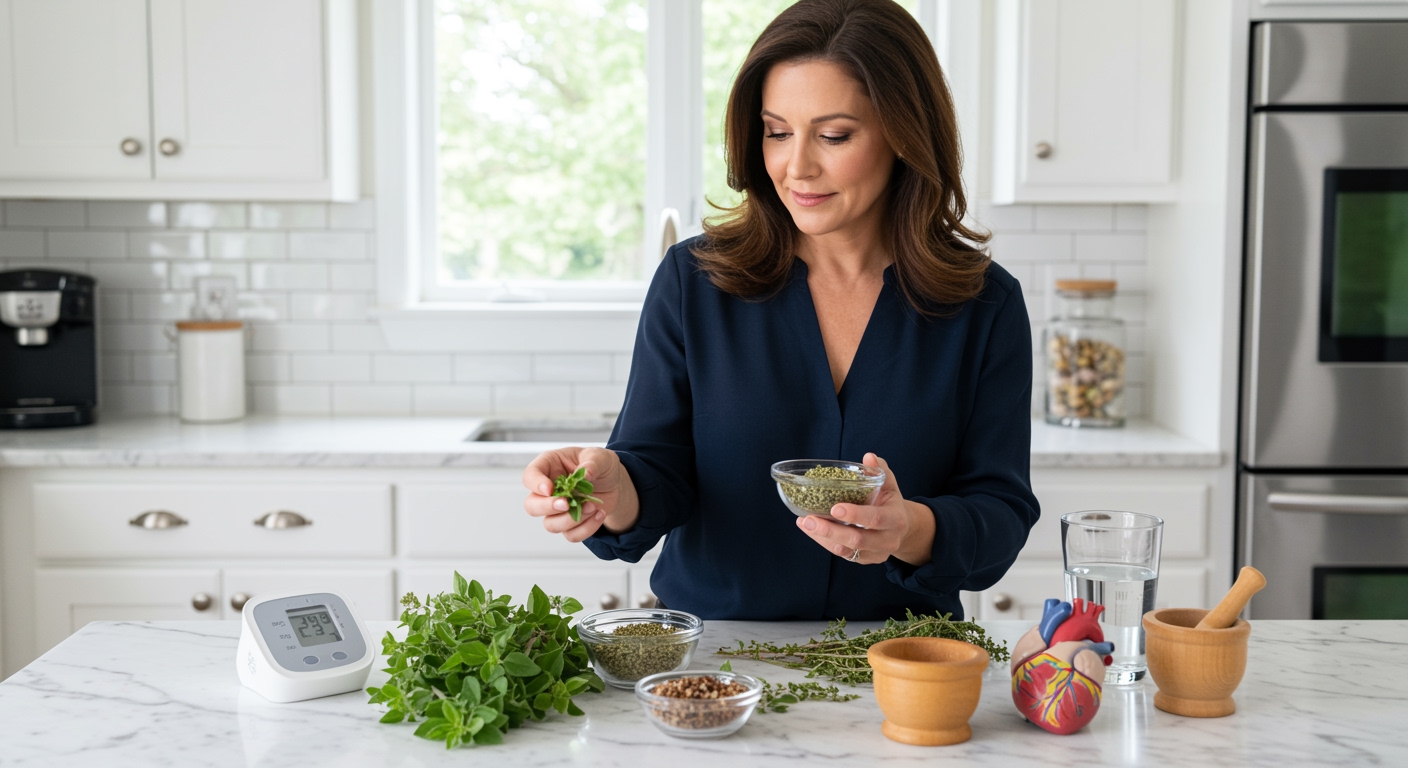✪ Key Takeaway: Oregano contains carvacrol and rosmarinic acid that may help lower blood pressure through vasodilation and antioxidant effects.
Introduction
You reach for oregano to season your pasta sauce, but this humble herb might be doing more than just adding flavor to your meal.
Many people struggle with high blood pressure and wonder if natural remedies like herbs could help manage their condition alongside conventional treatments.
Hi, I’m Abdur, your nutrition coach and today I’m going to explain how oregano might influence blood pressure and whether this kitchen staple deserves a place in your heart-healthy routine.
What Makes Oregano Special For Blood Pressure?
Oregano contains several bioactive compounds that researchers believe may influence cardiovascular health.
The most important compound is carvacrol, which makes up about 70-80% of oregano essential oil.
Studies show that carvacrol can cause vasodilation, which means it helps blood vessels relax and widen.
When your blood vessels relax, your heart doesn’t have to work as hard to pump blood through them.
Oregano also contains rosmarinic acid, a powerful antioxidant that may protect blood vessels from damage caused by free radicals.
These compounds work together to potentially support healthy blood pressure levels through multiple pathways in your body.
✪ Fact: Fresh oregano contains up to 42 times more antioxidants than apples.
How Does Oregano Actually Work In Your Body?
When you consume oregano, the active compounds enter your bloodstream and begin interacting with your cardiovascular system.
Carvacrol appears to work by blocking calcium channels in smooth muscle cells that line your blood vessels.
Calcium normally causes these muscles to contract and tighten, which increases blood pressure.
By blocking calcium, carvacrol helps these muscles stay relaxed, allowing blood to flow more easily.
The rosmarinic acid in oregano works differently by reducing inflammation in blood vessel walls.
Chronic inflammation can make blood vessels stiff and narrow, contributing to high blood pressure over time.
Together, these mechanisms may help maintain healthier blood pressure levels when oregano is consumed regularly as part of a balanced diet.
✪ Pro Tip: Use fresh oregano within a week of purchase to maximize its beneficial compound content.
What Does The Research Actually Show?
Several animal studies have shown promising results for oregano and blood pressure control.
One study found that rats given oregano extract experienced significant reductions in both systolic and diastolic blood pressure.
Another research project showed that carvacrol could lower blood pressure by up to 15-20% in hypertensive animals.
However, human studies on oregano and blood pressure are still limited.
Most of the evidence comes from laboratory studies and animal research, which don’t always translate directly to humans.
The few human studies that exist have focused on oregano’s antioxidant effects rather than blood pressure specifically.
While the preliminary evidence looks encouraging, we need more human clinical trials to make definitive claims about oregano’s blood pressure benefits.
✪ Note: Animal studies often use concentrated oregano extracts that contain much higher amounts than typical food consumption.
How Much Oregano Should You Actually Use?
The amount of oregano used in most studies is much higher than what people typically consume in food.
Research studies often use concentrated extracts equivalent to several tablespoons of dried oregano daily.
For practical purposes, adding 1-2 teaspoons of dried oregano or 1-2 tablespoons of fresh oregano to your meals daily is reasonable.
This amount provides beneficial compounds without overwhelming your taste buds or causing digestive issues.
You can easily incorporate oregano into pasta dishes, salads, roasted vegetables, and Mediterranean-style meals.
Remember that oregano works best as part of an overall heart-healthy eating pattern, not as a magic bullet for blood pressure control.
If you’re taking blood pressure medications, talk to your doctor before significantly increasing your oregano intake, as herbs can sometimes interact with medications.
✪ Pro Tip: Add oregano at the end of cooking to preserve more of its beneficial compounds.
Are There Any Risks Or Side Effects?
Oregano is generally safe for most people when used in normal cooking amounts.
However, some people may experience allergic reactions, especially if they’re sensitive to plants in the mint family.
Large amounts of oregano or oregano oil can cause stomach upset, nausea, or digestive issues in sensitive individuals.
Oregano may also interact with certain medications, particularly blood thinners and diabetes medications.
If you’re pregnant or breastfeeding, stick to normal food amounts of oregano and avoid concentrated supplements.
People with bleeding disorders should be cautious, as oregano might slow blood clotting.
As with any natural remedy, it’s important to view oregano as a complement to, not a replacement for, proven blood pressure treatments.
✪ Note: Always inform your healthcare provider about any herbs or supplements you use regularly.
The Bottom Line
Oregano shows promise for supporting healthy blood pressure through its active compounds carvacrol and rosmarinic acid, but the evidence is still developing.
Small steps with real foods often create bigger changes than searching for miracle cures.
I’d love to hear about your experiences with using herbs for health or any questions you might have about incorporating oregano into your routine, so please share your thoughts in the comments below.
References
At NutritionCrown, we use quality and credible sources to ensure our content is accurate and trustworthy. Below are the sources referenced in creating this article:





